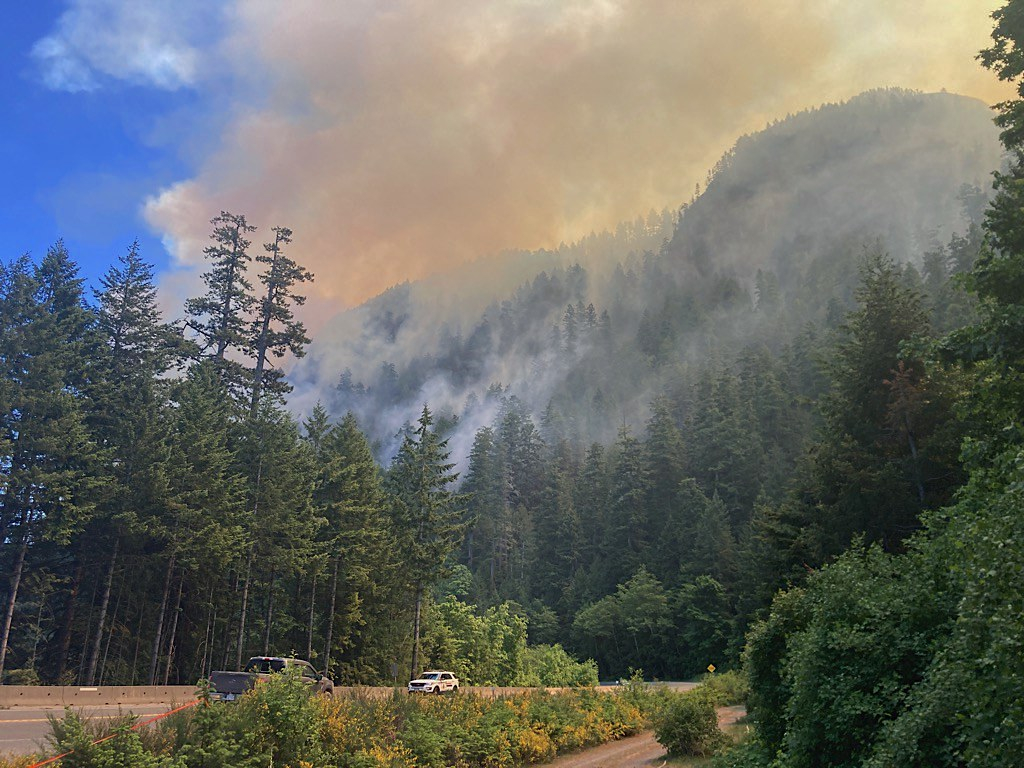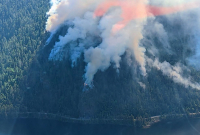Support strong Canadian climate journalism for 2025
Vancouver Island communities and tourist destinations under stress from the wildfire-related Highway 4 closure must wait at least another week before limited travel along the corridor can resume.
The top priority is to ensure the safety of communities and drivers along the vital transportation route, said B.C. Minister of Transportation Rob Fleming at a press conference Tuesday.
Closed for the past week, the highway is the only paved road serving Port Alberni, Ucluelet, numerous First Nations and Tofino — a tourist mecca on the West Coast. The regular flow of travellers and essential goods such as fuel and medicine to the communities west of the blaze has been badly curtailed.
“I understand that the closure has created major challenges for locals, businesses and tourists, and we are anxious to get the road open as quick as possible,” Fleming said.
“[But] we cannot reopen the highway until we know that the travelling public will be safe.”

Crews are working as urgently as safety allows to access and remove hazards such as large trees, debris and rocks that are falling hundreds of feet to the roadway from steep slopes scorched by the Cameron Bluffs wildfire, he said.
The road surface is largely intact, but some of the roadside barriers need repair, said Janelle Staite, the deputy regional director with highway services.
“As of today, we are still seeing rocks the size of coffee mugs coming down onto the highway,” Staite said.
Much of the falling debris is concentrated in the Angel Rock stretch of the highway, a prominent cliff face situated above the road alongside Cameron Lake, she said.
Two temporary measures are being devised to allow the highway to open, she added.
A protective metal mesh will be hung by cranes to act as a barrier to any further falling debris from the bluffs.
Additionally, a temporary wall structure or barricade will be raised to prevent debris from obstructing the highway’s eastbound lane.
The bluffs above the highway are mostly rock, so there’s no threat of a major landslide overwhelming the highway or vehicles, Staite said. The concern is individual branches or rocks being loosened by wet weather.
The highway is likely to be open to single-lane, alternating traffic by the weekend of June 24 and 25, Fleming said, noting travellers and residents on the highway should be patient and expect significant delays and traffic.
Conditions along the highway will be monitored closely before moving toward a full reopening, likely in mid-July, he added.
The current four-hour-long detour route between Cowichan Lake and Port Alberni along forestry and private industrial roads will remain open during the highway’s phased opening for essential travel, and so commercial transport trucks can continue the delivery of important supplies such as fuel and medicine.
To improve road safety and ensure the supply chain continues, the province has set up piloted convoys twice a day to lead commercial trucks and other vehicles travelling for essential purposes between Lake Cowichan and Port Alberni.
“That detour, though far from ideal, has kept food, fuel and other supplies on the move to the people that need them,” Fleming said, citing co-operation between the province, communities, the resource sector and the trucking industry to make it happen.
The ministry has also worked to improve road conditions and install roadside barriers, portable washrooms and checkpoints along the detour, he added.

Approximately 15,000 vehicles travel Highway 4 daily between Parksville and Port Alberni in the summer season, Staite said.
Currently, the detour route is seeing 1,000 vehicles a day and about 20 per cent of the typical commercial traffic.
“The route is operating very effectively with that level of traffic volume,” she said.
“It’s encouraging to see that drivers are considering whether or not that trip is essential and making the choice to remain home if they're able to.”
Fleming acknowledged communities in the Alberni Valley have been pushing for a permanent secondary route to avoid being stranded in the event of disasters for some time.
The previous government explored the possibility of an alternate route after the Dog Mountain wildfire tore the valley in 2015, he said.
“We will undoubtedly look at that again,” Fleming said.
“But the question of an alternate route — where it should be, how it may be built — are things we'll take a look at when we get through this situation.”
Many First Nations and communities impacted by the highway closure have asked tourists to postpone trips to the region to ease demand on the limited supply chain and prioritize the detour route for transport trucks.
Tofino, the top tourism destination served by Highway 4, hasn’t asked visitors to stay away but is advising tourists of the road closure.
The business community is feeling the effects of the dramatic drop in visitors, the municipality has said, especially the tourism sector, which made significant investments to prepare for the summer season and hire staff.
Both the municipality and Tofino Tourism are encouraging visitors still in town and locals to support local businesses and take advantage of meals, accommodations and activities that are being discounted due to the ongoing road closure.
Regular flights are still servicing Tofino, with some reportedly being added, Fleming said.
Airlines discounted flights while the Coquihalla Highway was closed after being damaged by flooding in 2021, and the ministry is discussing the possibility of similar measures, he added.

Josie Osborne, MLA for Mid Island-Pacific Rim, told Canada’s National Observer Tuesday she also hasn’t been able to return to her home community of Tofino since the highway was closed.
Though the supply chain is still functional, it’s still a challenging time for people in her riding, Osborne said.
“Some people are separated from their families right now,” she said.
“Others are not able to reach Tofino, for example, to start their seasonal work [while] others have been laid off temporarily.”
But the pandemic made clear that the community will work together to support everyone until the highway reopens.
‘We’ve been here before. It's a very resilient community, and we're going to soldier on.”
The highway closure and wildfire re-enforces the need for everyone to be flexible and prepare in case of disruptions or emergencies as a result of extreme weather or disasters.
But Osborne conceded she is eager to get back home as soon as she can.
“I’m also really anxious to get home and sleep in my own bed, but I guess it's going to be another week or two.”
Rochelle Baker / Local Journalism Initiative / Canada's National Observer






Comments
Josie Osborne is the B.C. Minister of Energy, Mines and Low Carbon Innovation. She ought to understand that as long as she is not winding down the natural gas industry she is partly responsible for her own fate.